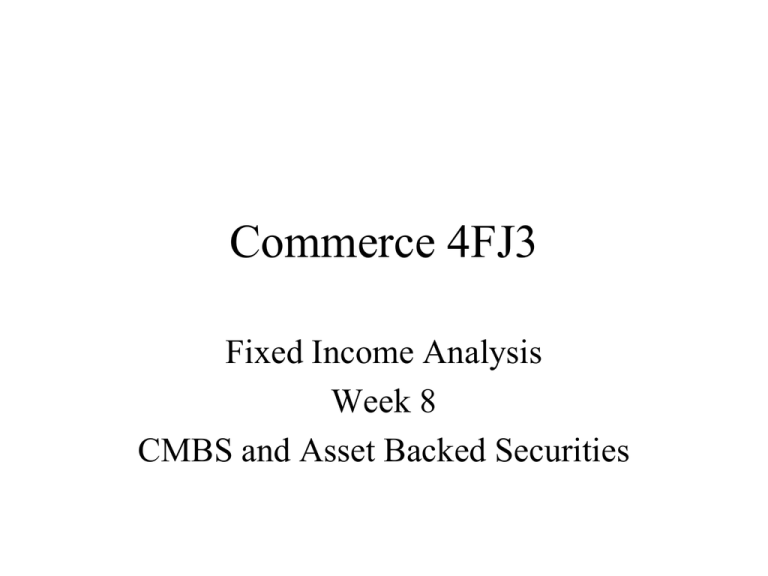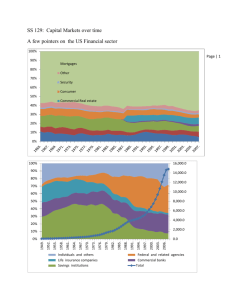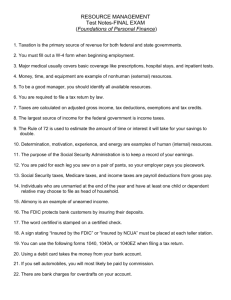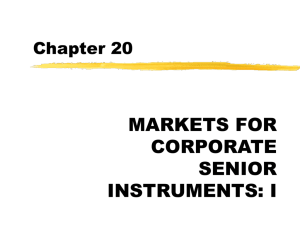Week 8
advertisement

Commerce 4FJ3 Fixed Income Analysis Week 8 CMBS and Asset Backed Securities Commercial Mortgage Loans • Loans secured by income producing properties – – – – Multifamily dwellings Office buildings Shopping centers Hotels • Are usually non-recourse loans 2 Credit Approval • 2 main ratings of the credit of an applicant – Debt to service coverage ratio (DSC); net operating income to debt service charges – Loan to Value (LTV); amount of principal outstanding compared to the present value of future net operating income 3 Call Protection • Most commercial mortgages do not allow free prepayments – – – – Prepayment lockout Defeasance Prepayment penalty points Yield maintenance charges 4 Prepayment Lockout • For a certain period of time, prepayments are not permitted • Lockout periods are often 2-10 years • Many loans with lockout periods also have other call protection that start once the lockout period ends 5 Defeasance • Second strongest form of call protection • To prepay, the borrower must pay an amount great enough to replicate missed cash flows with treasury securities – Often used by municipal bond issuers • Lenders may prefer getting prepayments as it increases the value of their loans 6 Prepayment Penalty Points • A fixed percentage charge on prepayments • Similar to call premiums on bonds • 5-4-3-2-1 is a common schedule, 5% penalty in year 1, dropping to 1% in year 5 • Penalty is paid even if interest rates are rising and the lender could benefit from the prepayment 7 Yield Maintenance Charges • Floating charges that make prepayments for refinancing unattractive • The lower the general level of interest rates the higher the yield maintenance charges – Simple model, bullet model, single discount factor, truncated interest difference model... • Usually drop to zero if interest rates are at or above the coupon rate 8 Balloons • Commercial mortgages typically have a balloon maturity provision • Lender may allow an extension if the borrower has difficulty refinancing, but charge a higher default interest rate – The possibility of default on the balloon payment is called balloon risk and, with the above provision can be a form of extension risk 9 Commercial MBS • Commercial mortgage backed securities are backed by 1 or more commercial mortgages • Can be issued by an agency (Ginne Mae, Freddie Mac, Fannie Mae) • More often issued privately due to not qualifying for government loan guarantees • Usually structured like CMOs 10 Example CMBS • • • • • From p. 321; National Bank 18 tranches rated AAA to BBB- or not rated Different default risk layers Senior tranches are sequential Floating rate tranches created without inverse floaters through use of swaps 11 Balloon Risk in CMBS • To offset balloon risk CMBS can include – Internal tail; a contractual obligation for the borrowers to provide proof of refinancing efforts 1 year before maturity and a refinancing commitment 6 months before maturity – External tail; sets the maturity of the CMBS longer than the maturity of the loans allowing for a work-out period in the event of delayed refinancing 12 Clean-Up Call Provision • Every CMBS transaction has a clean-up call provision that permits the bond classes that are outstanding to purchase the remaining mortgage loans in a trust. • The purpose of clean-up call in all securitizations is to wind-down the transaction when the balance remaining in the transaction is too small to justify the ongoing administrative fees. 13 Clean-Up Call Provision II • Typically the cleanup call provision is limited to when the balance of mortgage loans in the mortgage pool represents 1% to 3% of the deal’s original balance of the trust. • Usually the price at which the remaining loans can be repurchased is the outstanding balance of the mortgage loans plus accrued interest. 14 Single Borrower Deals • Single borrower/multi-property deals allow for some risk reduction through crosscollateralization and cross-default features • To prevent the borrower from removing a good asset from the pool and letting the remainder go into default, there are often property release provisions 15 Multi-Borrower Deals • CMBS deals put together by conduits • If the deal contains a single large loan in excess of $50 million and a large amount of smaller mortgages it is called a fusion conduit deal 16 Services • Can have a single servicer or multiple – Sub-servicer; collects cash and information – Master servicer; oversees the deal, verifies details of the agreement, makes timely payment of interest and principal (even when there are late payments) – Special servicer; deals with accounts more than 60 days overdue 17 Analysis of Collateral • Due to non-recourse basis the loans should be analysed as stand alone businesses – Performance indicators, LTV and DSC are reported regularly – Each type of business has it’s own set of associated risks, types of risk and amount of exposure are included in the prospectus – Geographic distribution is also reported 18 Stress Testing • Various models can be used to determine the impact of various levels of default and prepayment experience on the different tranches • Often done by analysts and bond ratings companies 19 Asset Backed Securities • Securities backed by pools of loans other than first lien mortgages are referred to as asset backed securities • Major types include; automobile loans, credit card receivables, home equity loans, and manufactured housing loans • Securitization not limited to loans; David Bowie royalties, parking ticket receivables 20 Credit Risk • Since these loans are not guaranteed, the investor faces credit risk • Four factors to consider – – – – Credit quality of the collateral Quality of the seller/servicer Cash flow stress and service structure Legal structure 21 Credit Quality of the Collateral • Analysis of the credit quality of the collateral depends on the asset type • Look at the borrower’s ability to pay and the borrower’s equity in the asset • Examine the experience of the lenders and assess if the assets being sold have the same qualities 22 Concentration Risk • With a large number of borrowers in a pool there can be significant diversification • If a few borrowers make up a large portion of the total pool this diversification can be lost, this is concentration risk • Some ratings companies put limits on the maximum percentage from one borrower 23 Credit Enhancement • As with MBS, asset backed securities often include credit enhancement to get the credit rating the issuer desires – External enhancement; insurance, corporate guarantees, letters of credit – Internal enhancement; reserve funds, overcollateralization, senior/subordinated structure 24 Quality of the Seller/Servicer • Duff & Phelps, for example, reviews the following when evaluating servicers: – – – – – – – servicing history experience originations servicing capabilities human resources financial condition growth/competition/business environment. 25 Cash Flow Stress and Payment Structure • The cash flow payments that must be made are; interest and principal to investors, servicing fees, and any other expenses for which the issuer is liable • Payment structure deals with payment priorities between tranches… is the structure a pass-through or pay-through 26 Legal Structure • If the corporate entity wishes to retain some interest in the collateral, there is concern that a bankruptcy court could redirect the collateral’s cash flows or the collateral itself • To avoid this, a bankruptcy-remote specialpurpose vehicle (SPV) is formed • The wholly owned corporation buys the loans and issues the asset backed security 27 Cash Flows • An asset backed security can have either amortizing or non-amortizing cash flows • If there are no scheduled principal payments then the issue is non-amortizing, even if the monthly minimum payment is greater than the interest charges • Prepayment and default rates must also be forecast 28 Automobile Loans • Cash flow: amortized, fixed or floating rate • Prepayments: – Caused by, replacement, repossession, loss or destruction, refinancing – Repossession rates sensitive to economic conditions – Modelled using absolute prepayment rate (ABS) as a percent of original balance 29 Automobile Loans • Payment structure – Smaller deals often pass-through – Larger deals usually pay-through • Credit enhancement – Typically uses senior/subordinated structure – Often uses some other credit enhancement to boost support to 8-12% 30 Credit Card Receivables • Cash Flow – Non-amortized, fixed or floating rate – Principal payments received in lockout or revolving period (18 months to 10 years) are reinvested in additional receivables – After the lockout period, principal payments are made to investors, this is called the principalamortization period 31 Credit Card Receivables • Early amortization triggers: if some event happens, the reinvestment in receivables is stopped early • Monthly payment rate (MPR): monthly payment divided by outstanding balance tracked, low levels can lead to extension risk and may trigger early amortization 32 Credit Card Payment Structure • Three different structures have been used: – Pass-through structure – Controlled amortization structure: payments are the lesser of a low principal payment schedule or the actual principal payments – Bullet-payment structure: all principal repaid at a certain date, during accumulation period, principal payments invested in cash accounts 33 C. C. Credit Enhancement • Early securities used bank letters of credit • Some credit downgrades of banks caused this to go out of favour • Common today are senior/subordinated structures with cash collateral accounts (or collateral invested accounts) • Typical support levels around 11% 34 HEL Backed Securities • Home equity loans are 2nd or lower lien mortgages; closed end is like a normal mortgage, open ended is like a line of credit • Cash Flow: monthly, similar to MBS, but prepayments reach a high level faster and at a higher level, with both tendencies exaggerated as the credit quality of the borrower decreases • Payment structures: any • Credit enhancements: any 35 Manufactured Housing • Manufactured Housing (mobile homes) loans can be issued as mortgages (if land included) or consumer retail instalment loans • MHBS can be issued by Ginnie Mae or by private entities 36 Manufactured Housing • Amortization period usually 15-20 years • Prepayments lower than conventional MBS – Lower prices, so less incentive to refinance – Depreciation often faster than principal pay down, so refinancing may be difficult – Lower average credit rating of borrowers • Payment structure and credit enhancement as for any other mortgage backed security 37 Dodd-Frank Wall Street Reform and Consumer Protection Act • Because of the turmoil that occurred in the securitization market and related sectors of the financial market, in July 2010, Congress passed the Dodd-Frank Wall Street Reform and Consumer Protection Act. 38 Dodd-Frank Wall Street Reform and Consumer Protection Act • The key features of the act; – Securitizes must retain a portion of the transaction’s credit risk – Reporting standards and disclosure – Representations and warranties required to be provided and the mechanisms for enforcing them – Due diligence requirements 39 Collateralized Debt Obligations • When the ABS market began, there was a debt product that employed the securitization to pool a diversified pool of some asset type and issue securities backed by the cash flow of the asset pool. These debt products are called collateralized debt obligations (CDOs) 40 Collateralized Debt Obligations • Although many types of asset classes have been used as collateral in a CDO, the following are the major ones: – – – – – – – investment-grade corporate bonds high-yield corporate bonds emerging market bonds nonagency residential mortgage-backed securities commercial mortgage-backed securities (CMBS); leveraged bank loans collateralized debt obligations 41



